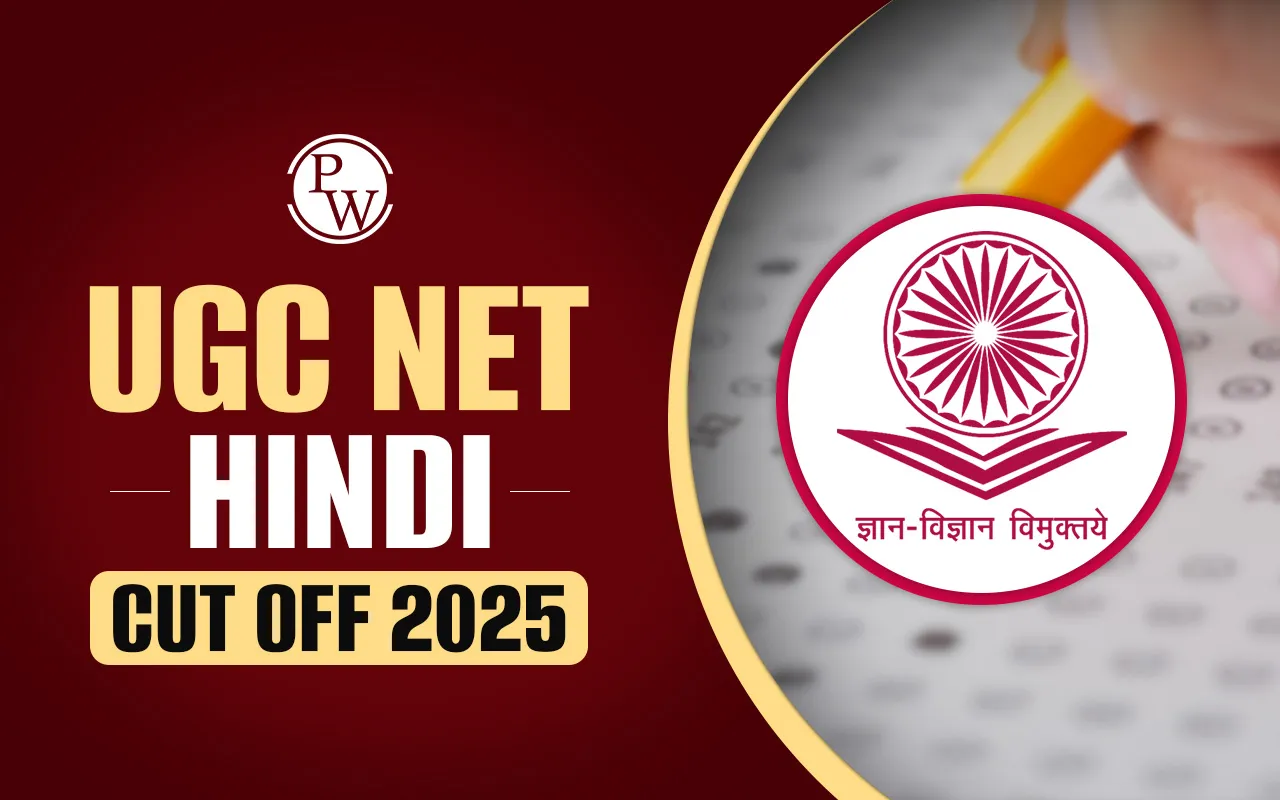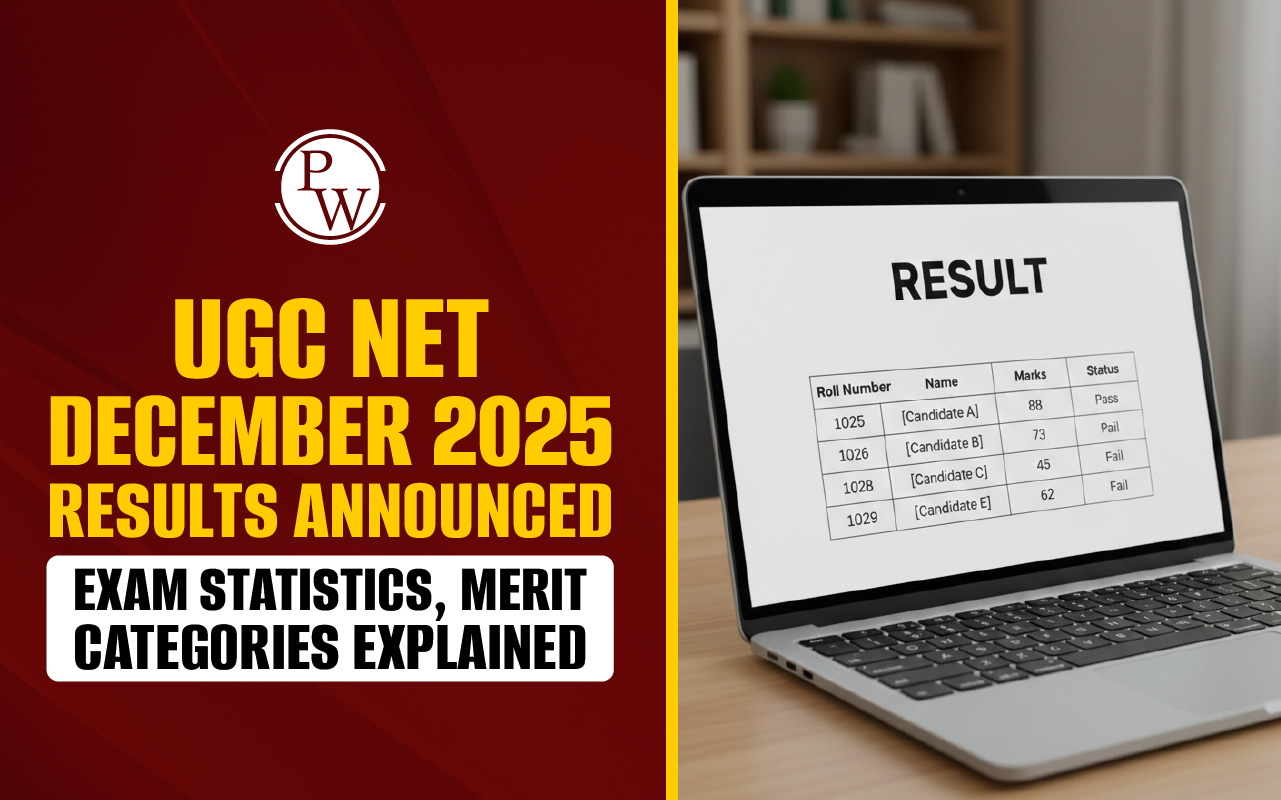
UGC NET Law Syllabus 2025: The UGC NET Law Syllabus 2025 is available on the National Testing Agency's (NTA) official website, ugcnet.nta.nic.in. The notification for the UGC NET December 2025 was officially released by the National Testing Agency (NTA) on October 7, 2025. The online application process started on October 7, 2025, and ran until 11:50 p.m. on November 7, 2025. Candidates can review the UGC NET Law Syllabus 2025, which includes the exam pattern, important topics, preparation tips, and more.
The UGC NET Law exam comprises two papers: Paper I and Paper II. Paper I assesses general teaching and research aptitude and is common across all subjects, while Paper II evaluates subject-specific knowledge in the field of law. Understanding the syllabus and exam pattern is essential for effective preparation and performance in the examination.
UGC NET Law Syllabus 2025
The National Testing Agency (NTA) conducts the UGC NET examination biannually to assess candidates for eligibility as Assistant Professor and for the award of Junior Research Fellowship (JRF) in Indian universities and colleges. For those preparing for the upcoming examination cycle, it is essential to review the UGC NET Law Syllabus 2025 carefully, as it provides a clear framework of the key topics and subject areas relevant to the exam. The syllabus is divided into two parts: Paper 1, which evaluates general teaching and research aptitude, and Paper 2, which focuses on domain-specific content in law.
UGC NET Law Syllabus 2025 Overview
| UGC NET Law Syllabus 2025 Overview | |
| Conducting Body | National Testing Agency (NTA) |
| Exam Name | UGC NET 2025 |
| Post Category | UGC NET Law Syllabus 2025 |
| Posts | Assistant Professor and Junior Research Fellowship (JRF) |
| UGC NET 2025 Exam Date | To Be Announced |
| Exam Level | National |
| Exam Frequency | Twice a year |
| Mode of Exam | Online |
| Time Duration | 3 Hours |
| Number of Papers and Total Marks |
|
| Number of Questions |
|
| Negative Marking | No Negative Marking |
| Exam Helpdesk No. | 0120-6895200 |
| Official Website | https://ugcnet.nta.nic.in/ |
UGC NET Law Syllabus 2025 PDF
The UGC NET Law Syllabus 2025 has been released in PDF format. The syllabus covers various topics in law, including constitutional law, administrative law, criminal law, and international law. The exam will assess the candidate's knowledge of legal principles, concepts, and their practical applications. Candidates are advised to thoroughly study the UGC NET Law Syllabus 2025 and prepare accordingly to succeed in the UGC NET Law exam. Candidates can download the UGC NET Law Syllabus 2025 directly using the link provided.
UGC NET Law Syllabus 2025 PDF in Hindi
The UGC NET Law Syllabus 2025 is available in PDF format in Hindi. The UGC NET Law Syllabus 2025 includes subjects such as constitutional law, administrative law, criminal law, civil law, and jurisprudence. Candidates preparing for the UGC NET Law exam are advised to refer to this syllabus and create a study plan accordingly. Candidates can download the UGC NET Law Syllabus 2025 PDF in Hindi directly using the link provided.
UGC NET Law Syllabus 2025 Unit Wise
The UGC NET Law Syllabus comprehensively covers various topics related to different areas of law. It offers a detailed breakdown of each of the 10 units comprising Paper 2, such as Constitutional Law of India, Jurisprudence, Administrative Law, Law of Crimes and Torts, Family Law, Law of Contracts and Mercantile Law, Public International Law and Human Rights Law, Environmental Law, Labour and Industrial Law, etc. Candidates can check the latest UGC NET Syllabus 2025 for Law, as highlighted in the following section.
| UGC NET Law Syllabus 2025 Unit Wise | |
| Unit Name | Topics |
| Unit 1: Jurisprudence | Nature and sources of law, Schools of jurisprudence, Law and morality, Concept of Rights and duties, Legal personality, Concepts of property, ownership, and possession, Concept of liability, Law, poverty, and Development, Global justice, Modernism and post-modernism. |
| Unit 2: Constitutional and Administrative Law | Preamble, Fundamental rights and duties, directive principles of state policy, Union and State executives and their Interrelationship, Union and State legislature and distribution of legislative powers, Judiciary, Emergency provisions, Temporary, transitional and special provisions in respect of certain states, Election Commission of India, Nature, scope and Importance of administrative law, Principle of natural justice, Judicial review of administrative actions – Grounds. |
| Unit 3: Public International Law and IHL | International law – Definition, nature, and basis, Sources of International Law, Recognition of states and governments, Nationality, immigrants, refugees, and internally displaced persons (IDPs), Extradition and asylum, United Nations and its organs, Settlement of international disputes, World Trade Organization (WTO), International humanitarian law (IHL) - Conventions and protocols, Implementation of IHL - Challenges. |
| Unit 4: Law of Crimes | General principles of criminal liability – Actus reus and mens rea, individual and group liability and constructive liability, Stages of crime and inchoate crimes - Abetment, criminal conspiracy, and attempt, General exceptions, Offences against the human body, Offences against state and terrorism, Offences against property, Offences against women and children, Drug trafficking and counterfeiting, Offences against public tranquillity, Theories and kinds of punishments, Compensation to the victims of crime. |
| Unit 5: Law of Torts and Consumer Protection | Nature and definition of tort, General principles of tortious liability, General defenses, Specific torts – Negligence, nuisance, trespass, and defamation, Remoteness of damages, Strict and absolute liability, Tortious liability of the State, The Consumer Protection Act 1986 - Definitions, consumer rights and redressal mechanism, The Motor Vehicles Act, 1988 - No-fault liability, third-party insurance and claims tribunal, The Competition Act, 2002 - Prohibition of certain agreements, abuse of dominant position, and regulation of combinations. |
| Unit 6: Commercial Law | Essential elements of contract and e-contract, Breach of contract, frustration of contract, void and voidable agreements, The standard form of contract and quasi-contract, Specific contracts - Bailment, pledge, indemnity, guarantee, and agency, Sale of Goods Act, 1930, Partnership and limited liability partnership, Negotiable Instruments Act, 1881, Company law – Incorporation of a company, prospectus, shares, and debentures, Company law – Directors and meetings, Corporate social responsibility. |
| Unit 7: Family Law | Sources and schools, Marriage and dissolution of marriage, Matrimonial remedies - Divorce and theories of divorce, Changing dimensions of the institution of marriage – Live-in relationship, Recognition of foreign decrees in India on marriage and divorce, Maintenance, dower, and stridhan, Adoption, guardianship, and acknowledgement, Succession and inheritance, Will, gift, and wakf, Uniform Civil Code. |
| Unit 8: Environment and Human Rights Law | Meaning and concept of ‘environment’ and ‘environmental pollution, International environmental law and UN Conferences, Constitutional and legal framework for the Protection of the environment in India, Environmental Impact Assessment and Control of hazardous waste in India, National Green Tribunal, Concept and development of human rights, Universalism and cultural relativism, International Bill of Rights, Group rights – Women, children, persons with disabilities, elderly persons, minorities and weaker sections, Protection and enforcement of human rights in India – National Human Rights Commission, National Commission for Minorities, National Commission for Women, National Commission for Scheduled Castes, National Commission for Scheduled Tribes, and National Commission for Backward Classes. |
| Unit 9: Intellectual Property Rights and Information Technology Law | Concept and meaning of intellectual property, Theories of intellectual property, International conventions about intellectual properties, Copyright and neighbouring rights – Subject matters, limitations and exceptions, infringement and remedies, Law of patent – Patentability, the procedure for grant of patent, limitations and exceptions, infringement and remedies, Law of trademark – Registration of trademarks, kinds of trademarks, infringement and passing off remedies, Protection of Geographical Indications, Biodiversity and Traditional Knowledge, Information technology law- digital signature and electronic signature, electronic governance, electronic records and duties of subscribers, Cyber crimes, penalties and adjudication. |
| Unit 10: Comparative Public Law and Systems of Governance | Comparative Law – Relevance, methodology, problems, and Concerns in Comparison, Forms of governments – Presidential and parliamentary, unitary and federal, Models of federalism – USA, Canada and India, Rule of Law – ‘Formal’ and ‘substantive’ versions, Separation of powers – India, UK, USA, and France, Independence of judiciary, judicial activism and accountability – India, UK and USA, Systems of constitutional review – India, USA, Switzerland and France, Amendment of the Constitution – India, USA, and South Africa, Ombudsman – Sweden, UK, and India, Open Government and Right to Information - USA, UK, and India. |
UGC NET Law Syllabus 2025 Important Topics
The UGC NET Law Syllabus is divided into two papers: Paper I, which consists of 50 objective-type questions of 100 marks, and Paper II, which consists of 100 multiple-choice questions of 200 marks. The exam will be conducted online. The NTA UGC NET Law Syllabus covers the following important topics:
- Jurisprudence
- Constitutional and Administrative Law
- The Law of Crimes
- The Law of Torts and Consumer Protection
- Commercial Law
- Family Law
- Environment and Human Rights Law
- Intellectual Property Rights and Information Technology Law
- Comparative Public Law and Systems of Governance
| UGC NET Syllabus 2025 of Other Subjects | |
| UGC NET Commerce Syllabus 2025 | UGC NET Economics Syllabus 2025 |
| UGC NET History Syllabus 2025 | UGC NET Education Syllabus 2025 |
UGC NET Law Exam Pattern 2025
A strategic preparation plan depends on a comprehensive understanding of the UGC NET Exam Pattern 2025 for Law, which consists of two papers: Paper 1 and Paper 2. Paper 1, common to all subjects, assesses the teaching and research aptitude of candidates. Meanwhile, Paper 2 consists of multiple choice questions (MCQs) in line with the UGC NET Law syllabus for 2025.
| UGC NET Law Exam Pattern 2025 | ||||
| Paper | Sections | Number of Questions | Maximum Marks | Marking Scheme |
| Paper 1 | Teaching Aptitude, Research Aptitude, Reading Comprehension, Communication, Reasoning (including Maths), Logical Reasoning, Data Interpretation, Information & Communication Technology (ICT), People & Environment, and Higher Education System | 50 | 100 |
|
| Paper 2 | Law | 100 | 200 | |
Books to Cover UGC NET Law Syllabus 2025
Candidates are advised to thoroughly review the UGC NET Law Syllabus and exam pattern and allocate study time for each topic. Candidates can refer to these books to cover the UGC NET Law Syllabus for 2025 and score well in their exams.
| Books to Cover UGC NET Law Syllabus 2025 | |
| Books Name | Author Name |
| The Indian Penal Code | Ratanlal Dhirajlal |
| NTA UGC NET Law previous years question papers | Pearson |
| UGC NET/JRF/SLET Law (Paper-II) | M. A. Rashid |
| UGC-NET: Law (Paper-II) Exam Guide | Aproov Bhardwaj (R Gupta’s Publication) |
| Trueman’s UGC NET Law | Suman Chauhan |
| Foreign Policy of India | VN Khanna and Leslie K Kumar |
| Indian Polity | M. Laxmikant |









